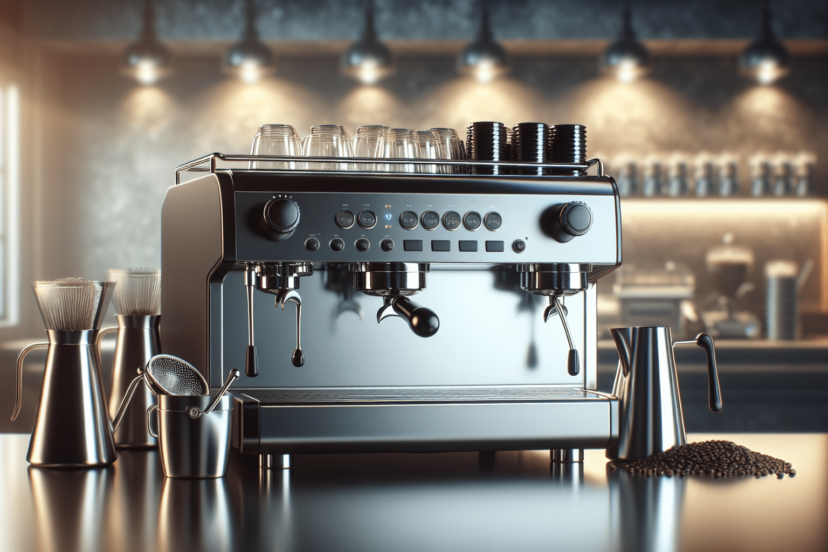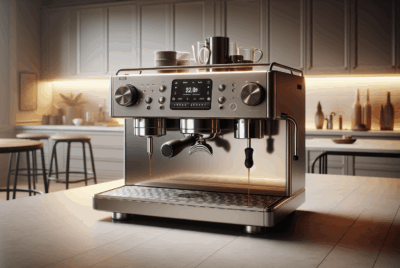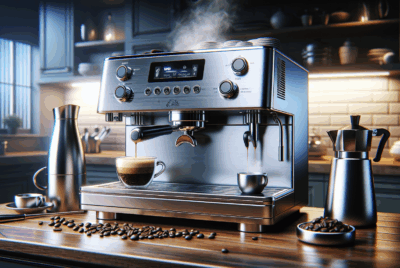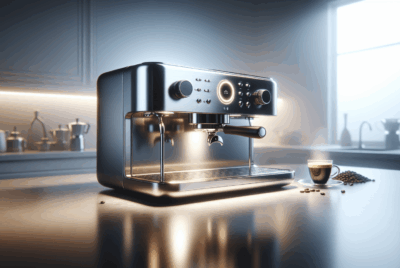The Ultimate Guide to Choosing an Industrial Espresso Machine
As an Amazon Associate, I earn from qualifying purchases, at no additional cost to you. Disclaimer
Are you in the market for an industrial espresso machine but feeling overwhelmed by the options and specifications? Finding the perfect espresso machine for your business can make a significant difference in the quality of your coffee and the efficiency of your café or restaurant. Let’s walk through everything you need to know to make an informed decision.
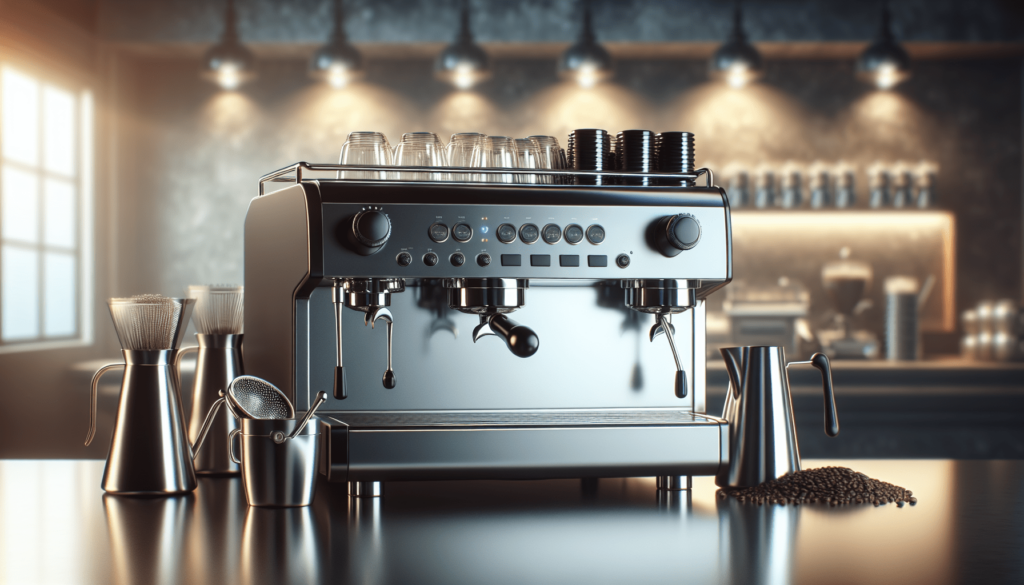
Click Here to Discover Coffee-Making Tips
Understanding Your Needs
Before delving into the various types of industrial espresso machines and their features, it’s crucial to assess your specific needs. Ask yourself questions such as:
- How many cups of espresso do you expect to serve daily?
- What is your budget range?
- Do you require a machine that is easy to use for a large staff?
- Are there any space constraints in your establishment?
- Do you need additional features like milk frothers or dual boilers?
Understanding these aspects will give you a clearer idea of what to look for in an industrial espresso machine.
Types of Industrial Espresso Machines
Below are the main types of industrial espresso machines, each catering to different needs and preferences.
Manual Espresso Machines
Manual espresso machines, also known as lever machines, require the barista to manually control the pressure by pulling a lever. These machines offer a high level of control over the brewing process but demand significant skill and experience.
Pros:
- Full control over brewing parameters
- Enhanced flavor customization
- Usually, a more vintage, aesthetic appeal
Cons:
- Steeper learning curve
- Requires more physical effort and time
Semi-Automatic Espresso Machines
Semi-automatic machines balance control and convenience. While you still control the grind size, dose, and tamp, the machine automates pressure and duration.
Pros:
- Consistent results
- Greater control than fully automatic machines
- More accessible price range
Cons:
- Requires some barista skills
- Slightly less convenient than fully automatic options
Fully Automatic Espresso Machines
Fully automatic machines handle the entire brewing process, from pressure to shot timing. These machines are ideal for busy environments where speed and consistency are paramount.
Pros:
- User-friendly
- Quick and efficient
- Consistent espresso shots
Cons:
- Higher initial cost
- Limited customization
Super-Automatic Espresso Machines
Super-automatic machines are the epitome of convenience. They grind, dose, tamp, and brew—all at the touch of a button. Some models even include built-in milk frothers.
Pros:
- Ultimate convenience
- Best for high-volume establishments
- Consistent quality
Cons:
- Expensive
- Limited control over brewing parameters
Key Features to Consider
When choosing an industrial espresso machine, several key features can impact performance, ease of use, and the quality of your coffee.
Boilers
The type and number of boilers can greatly affect your machine’s performance.
Single Boiler: Suitable for low to medium volumes, ideal for smaller cafés.
Dual Boiler: Offers the ability to steam milk and brew coffee simultaneously, making it perfect for high-volume settings.
Heat Exchanger: Provides almost instant steam and offers a balance between performance and cost.
| Feature | Single Boiler | Dual Boiler | Heat Exchanger |
|---|---|---|---|
| Performance | Low to medium-volume settings | High-volume settings | Medium to high-volume settings |
| Simultaneous Use | No | Yes | Yes |
| Cost | More affordable | More expensive | Moderate |
Pump Type
The type of pump used can influence both the quality of the espresso and the machine’s longevity.
Vibratory Pumps: More affordable, though noisier and less durable.
Rotary Pumps: Quieter, more durable, and provide consistent pressure.
Built-in Grinder
A built-in grinder can streamline your workflow, but ensure that it meets your quality standards.
Integrated Grinder: Convenient, saves space, but often less powerful than standalone grinders.
Standalone Grinder: Requires more space and an extra purchase, but offers higher grind quality and customization.
Group Heads
The number of group heads directly correlates with the volume of espresso you can produce simultaneously.
Single Group: Suitable for low-volume settings.
Double Group: Ideal for medium to high-volume environments.
Triple or Quad Group: Perfect for busy, high-volume establishments.
Steam Wands and Frothers
If milk-based beverages are popular with your customers, consider the type and number of steam wands or automatic frothers.
Manual Steam Wand: Offers control but requires skill and practice.
Automatic Frother: User-friendly and provides consistent results, ideal for high-volume settings.
Budget Considerations
Choosing the right industrial espresso machine is not just about features but also involves balancing quality and cost. Determine a realistic budget by considering the following factors:
Initial Cost
The upfront cost can range from a few thousand to tens of thousands of dollars, depending on the machine’s features and brand.
Maintenance and Repairs
All machines will require maintenance over time. Regular servicing can extend the lifespan, but it’s important to budget for potential repairs and part replacements.
Operational Costs
Consider the cost of electricity, water, and any additional supplies that your machine might require, such as specific types of filters or cleaning agents.
Long-Term Value
Sometimes investing more upfront in a higher-quality machine can save you money in the long run by reducing maintenance costs and downtime.
| Budget Element | Considerations |
|---|---|
| Initial Cost | Upfront purchase price |
| Maintenance & Repairs | Regular servicing, part replacements |
| Operational Costs | Utilities, supplementary items (filters, cleaners) |
| Long-Term Value | Potential savings from higher quality and durability |
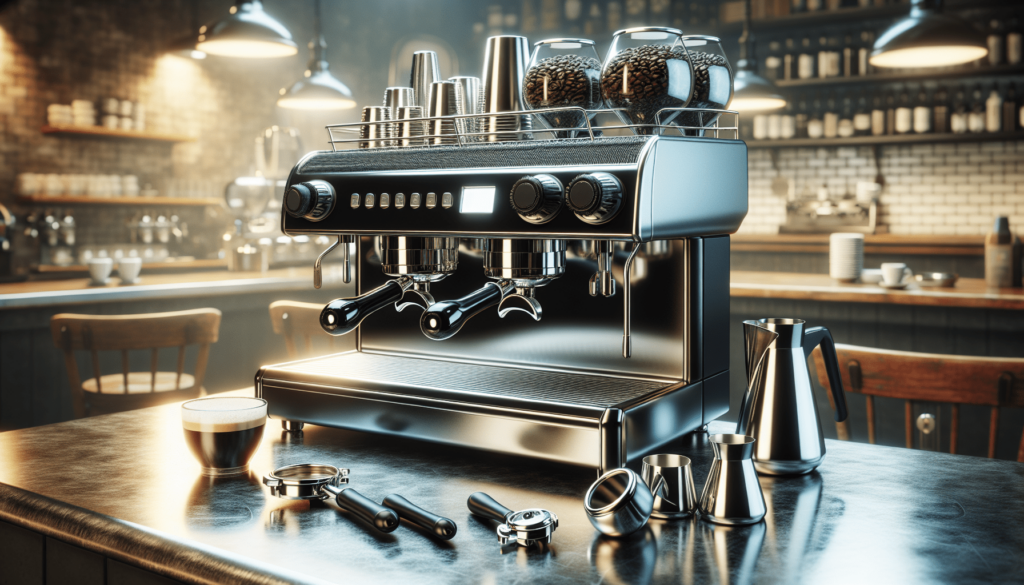
Click Here to Start Brewing Like a Pro
Brand Reputation and Reviews
The brand of your espresso machine can offer cues about its reliability and customer service. Look for reviews and testimonials from other businesses to gauge overall satisfaction.
Popular Brands to Consider
La Marzocco: Known for premium quality and durability.
Nuova Simonelli: Offers a balanced range of features and cost.
Jura: Excellent super-automatic machines for high-volume settings.
Rancilio: Provides good mid-range options with robust performance.
Gaggia: Known for affordable yet reliable machines.
Tips for Making the Final Decision
Now that you have a good understanding of what each type of industrial espresso machine offers and the key features to consider, here are some final tips to help you make the best decision:
Test Before Buying
If possible, try to test the machine in a real-world setting. Many suppliers offer demos where you can see the machine in action and assess its ease of use, performance, and coffee quality.
Consultation with Suppliers
Don’t hesitate to consult multiple suppliers. Getting different viewpoints can provide valuable insights into which machine might be best for your needs.
Long-Term Warranty
Consider the warranty offered. A longer warranty can be an indication of the manufacturer’s confidence in the machine’s durability and can provide you with peace of mind.
Staff Training
Ensure your staff is well-trained on how to use and maintain the machine. Proper use and care can extend its lifespan and improve the quality of your coffee.
Conclusion
Choosing the right industrial espresso machine for your business is a significant decision that can impact your efficiency, coffee quality, and customer satisfaction. Assess your specific needs, consider the various types of machines and their features, and don’t overlook the importance of budget, brand reputation, and long-term costs. By taking these factors into account, you can select an industrial espresso machine that perfectly aligns with your business goals and operational requirements.
Taking the time to make an informed decision will pay off in the long run, ensuring that your customers enjoy every cup of coffee while your staff operates seamlessly. Here’s to making the best choice for your establishment and serving up countless delicious espressos!

